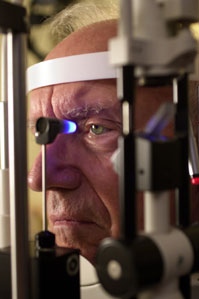Adult Vision: Over 60 Years of Age
It's a fact of life that vision changes occur as you get older. But these changes don't have to compromise your lifestyle. Knowing what to expect and when to seek professional care are important steps to safeguarding your vision.As you reach your 60s and beyond, you need to be attentive to warning signs of age-related eye health problems that could cause vision loss. Many eye diseases have no early symptoms. They may develop painlessly and you may not be aware of changes to your vision until the condition is quite advanced. But wise lifestyle choices and regular eye exams can significantly improve your chances of maintaining good eye health even as you age.
 You may not realize that health problems affecting other parts of your body can affect your vision as well. Individuals with diabetes or hypertension (high blood pressure), or taking medications that have eye-related side effects, are at greatest risk for developing vision problems.
You may not realize that health problems affecting other parts of your body can affect your vision as well. Individuals with diabetes or hypertension (high blood pressure), or taking medications that have eye-related side effects, are at greatest risk for developing vision problems.Therefore, regular eye exams are even more important as you reach your senior years. The American Optometric Association recommends annual eye examinations for everyone over age 60. See your doctor of optometry immediately if you notice any changes in your vision.
Age-related Eye and Vision Problems
In the years after you turn 60, a number of eye diseases may develop that can change your vision permanently. The earlier these problems are detected and treated, the more likely you can retain good vision.The following are some vision disorders of which you should be aware:
- Age-related macular degeneration (AMD) is an eye disease affecting the macula, the center of the light sensitive retina at the back of the eye, causing loss of central vision. Although small, the macula is the part of the retina that allows us to see fine detail and colors. Activities like reading, driving, watching TV and recognizing faces all require good central vision provided by the macula. While macular degeneration causes changes in central vision, peripheral or side vision remains unaffected.
 Diabetic retinopathy is a condition occurring in people with diabetes. It is the result of progressive damage to the tiny blood vessels that nourish the retina. They leak blood and other fluids that cause swelling of retinal tissue and clouding of vision. The condition usually affects both eyes. The longer a person has diabetes, the more likely they will develop diabetic retinopathy, which can cause blindness.
Diabetic retinopathy is a condition occurring in people with diabetes. It is the result of progressive damage to the tiny blood vessels that nourish the retina. They leak blood and other fluids that cause swelling of retinal tissue and clouding of vision. The condition usually affects both eyes. The longer a person has diabetes, the more likely they will develop diabetic retinopathy, which can cause blindness.
- Retinal detachment is a tearing or separation of the retina from the underlying tissue. It can be caused by trauma to the eye or head, health problems like advanced diabetes, and inflammatory disorders of the eye. But it most often occurs spontaneously as a result of changes to the gel-like vitreous fluid that fills the back of the eye. If not treated promptly, it can cause permanent vision loss.
- Cataracts are cloudy or opaque areas in the normally clear lens of the eye. Depending upon their size and location, they can interfere with normal vision. Usually cataracts develop in both eyes, but one may be worse than the other. Cataracts can cause a decrease in contrast sensitivity, a dulling of colors and increased sensitivity to glare.
- Glaucoma is a group of eye diseases characterized by damage to the optic nerve resulting in vision loss. People with a family history of glaucoma, African Americans and older adults are at higher risk for developing the disease.
- Dry eye is a condition in which there is an insufficient amount of tears or a poor quality of tears to lubricate and nourish the eye. Tears are necessary for maintaining the health of the front surface of the eye and for providing clear vision. Dry eyes are a common and often chronic problem, particularly in older adults.
Driving Safely After 60
If you are 60 or older, driving a car may be increasingly difficult. Age-related vision changes and eye diseases can compromise driving ability, even before you are aware of symptoms. You may be noticing difficulty judging distances and speed. Bright sunglight or the headlights of oncoming traffic at night may impair your vision. Some age-related vision changes that commonly affect seniors' driving are:
Some age-related vision changes that commonly affect seniors' driving are:
- Not being able to see road signs as clearly
- Having difficulty seeing objects up close like the car instrument panel or road maps
- Changes in color perception
- Problems seeing in low light or nighttime conditions
- Difficulty adapting to glare from headlights
- Experiencing a loss of side vision
- Use extra caution at intersections.
Many collisions involving older drivers occur at intersections due to a failure to yield, especially when taking a left turn. Look carefully in both directions before proceeding into an intersection and turn your head frequently when driving to compensate for any decreased peripheral vision.
- Reduce your speed and limit yourself to daytime driving.
If you are having trouble seeing at night or your eyes have difficulty recovering from the glare of oncoming headlights, slow down and avoid driving at night or on unfamiliar roads, whenever possible.
- Avoid wearing eyeglasses and sunglasses with wide frames or temples.
Glasses with wide temples (side arms) may restrict your side vision.
- Take a driving course for seniors.
Participate in a program for older drivers in your community, such as those offered by the American Association of Retired Persons (AARP). This can help you learn more about physical changes that may affect your driving ability and how to compensate for them.
- Have an annual vision examination.
Yearly eye exams can ensure your eyeglass or contact lenses prescription is up to date and provide for early detection of any developing eye health problem.
Dealing with Vision Loss
 Unfortunately, some people over 60 experience loss of sight beyond the normal, age-related vision changes. Macular degeneration, glaucoma, and diabetic retinopathy are among the eye health conditions that can lead to permanent vision loss. This loss of vision can take many forms and it may exist in varying degrees.
Unfortunately, some people over 60 experience loss of sight beyond the normal, age-related vision changes. Macular degeneration, glaucoma, and diabetic retinopathy are among the eye health conditions that can lead to permanent vision loss. This loss of vision can take many forms and it may exist in varying degrees.It is important to understand that visual acuity alone is not a good predictor of the degree of visual difficulty that a person may have. Someone with relatively good acuity (e.g., 20/40) can have difficulty functioning, while someone with worse acuity (e.g., 20/100) might not be experiencing any significant functional problems. Other visual factors such as poor depth perception, limited side vision, extreme sensitivity to lights and glare, and reduced color perception can also limit a person's ability to do everyday tasks.
However, low vision rehabilitative services can provide people with the help and resources needed to regain their independence. Individuals with low vision can be taught a variety of techniques to allow performance of daily activities with the remaining vision.
Your doctor of optometry can help plan a rehabilitation program so that you may resume an independent life within your condition's limitations. A wide variety of rehabilitation options are available to help people with low vision live and work more effectively, efficiently, and safely. Most people can be helped with one or more low vision treatment options. The more commonly prescribed devices are:
- Spectacle-mounted magnifiers — A magnifying lens is mounted in spectacles (this type of system is called a microscope) or on a special headband. This allows use of both hands to complete a close-up task, such as writing a letter.
- Hand-held or spectacle-mounted telescopes — These miniature telescopes are useful for seeing longer distances, such as across the room to watch television, and can also be modified for near (reading) tasks.
- Hand-held and stand magnifiers — These are convenient for short-term reading of things such as price tags, labels, and instrument dials. Both types can be equipped with lights.
- Video magnification — Table-top (closed-circuit television) or head-mounted systems enlarge reading material on a video display. Some systems can be used for distance views tasks. These are portable systems, and those that can be used with a computer or monitor. Image brightness, image size, contrast, and foreground/background color and illumination can be customized.
[back to top]
